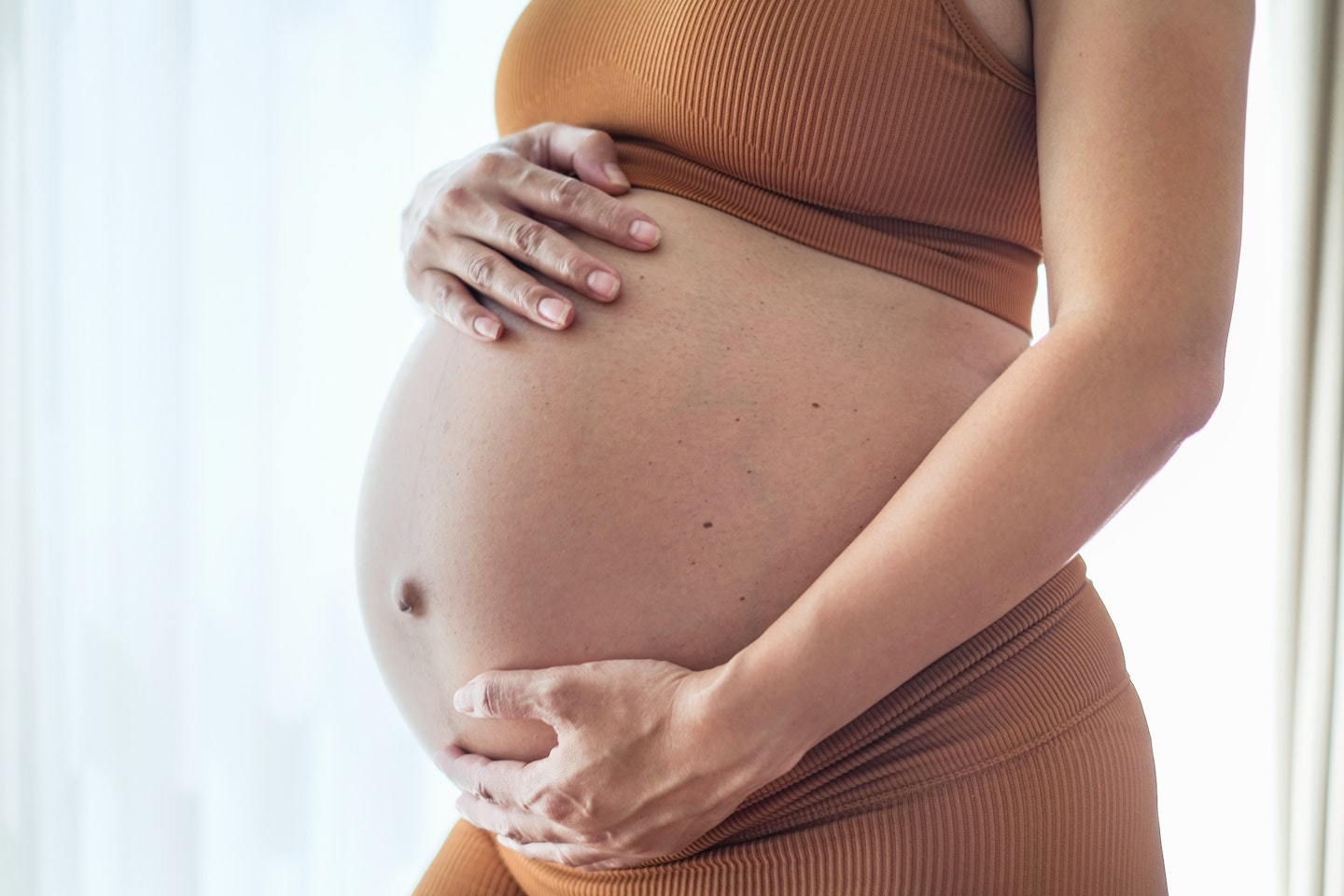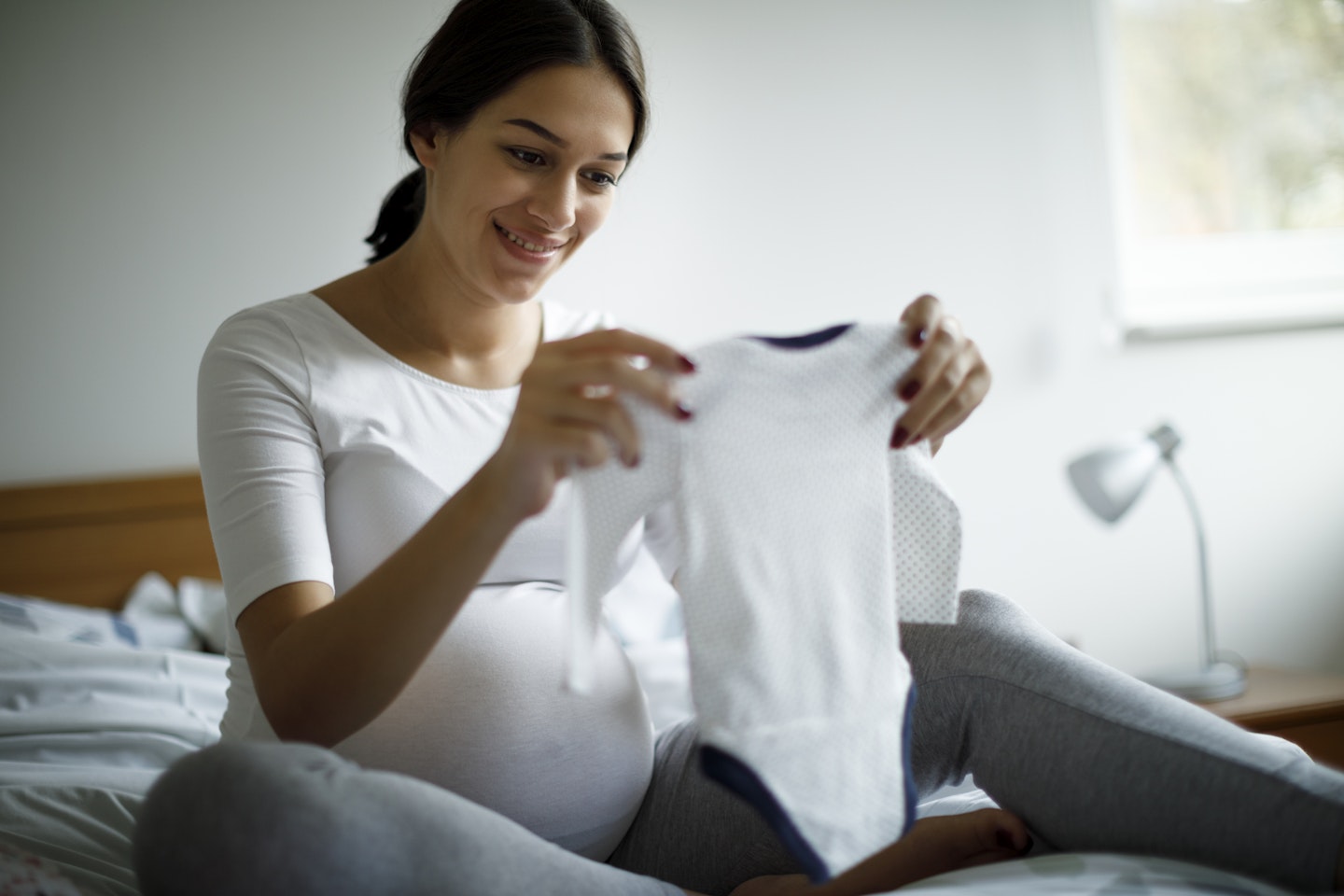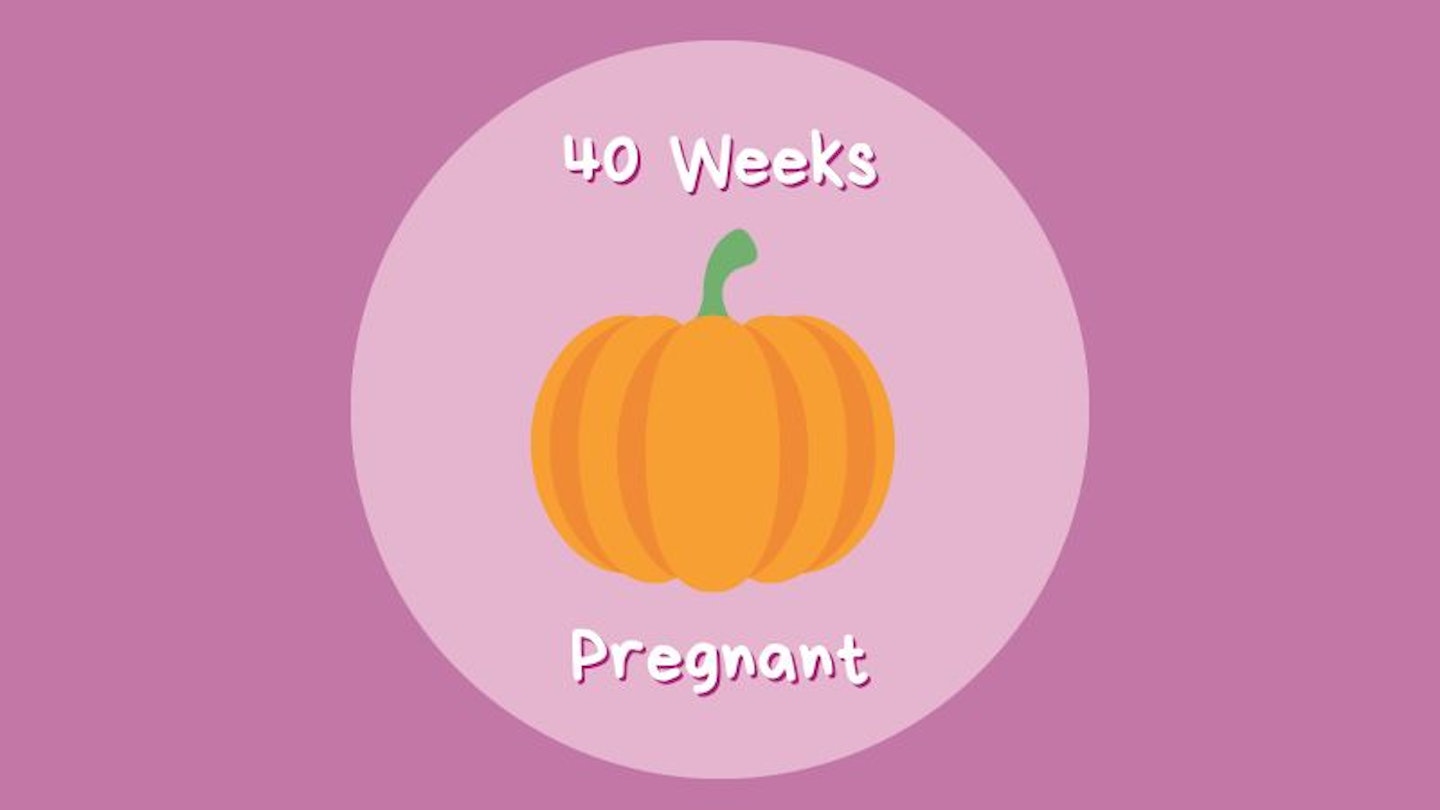It’s the official end of your pregnancy, but your baby might have other ideas. After all, they've been tucked away in your tummy for 9 months and you can't blame them for wanting to enjoy that comfort a little longer. Though some babies come on time, around 30 per cent of pregnancies last longer than 40 weeks.
So while you might be desperate to finally meet your baby, you may still have up to two weeks left of your pregnancy. But there's plenty to keep you busy while you wait; if you're a first time mum you'll have an antenatal appointment this week, you can also pack your hospital bag and make sure you're ready for labour. We'll also look at how you can look after yourself in week 40 and what your baby is doing this week.
We've spoken to experts, Midwife Pip, Midwife Marley and Dr Tiffany Pham, to find out everything you need to know about your baby and what you can expect when you're 40 weeks pregnant.
How many months pregnant is 40 weeks?
At 40 weeks pregnant, you are 9 months pregnant and at the end of your third trimester. This means your baby is full term and will be due any day now.

Baby development at 40 weeks pregnant
How big is my baby at 40 weeks pregnant?
According to NHS guidance, your baby probably weighs anywhere from 6 to 9 pounds and measures around 51.2cm (about the size of a little pumpkin). Of course, a lot of perfectly healthy babies are born smaller or bigger.
What's my baby doing at 40 weeks pregnant?
Movement:
By 40 weeks your baby is probably getting a little squashed but should still be active and moving around in their usual pattern. The NHS says "you should feel your baby move right up to and during labour". By now, you may have noticed a pattern to your baby's movements so if you think they're moving less than normal or you can't feel any movement, contact your midwife or maternity unit straight away – there will be someone there to answer calls 24 hours a day.
Development:
By week 40 your baby is practising the art of coordination and they can now respond to sounds, blink, clench their fist and even turn their head. They are ready to enter the world and see you.
Your baby is still growing hair and nails and even though their organs are fully formed, they are still working on lung development. The fine hair (lanugo) that covered your baby's body will be mostly gone, although there may be a little bit still there when they are born.

40 weeks pregnant symptoms
You may be treasuring the last weeks of pregnancy, or be tired of feeling pregnant and ready to say goodbye to the more annoying symptoms. But until baby arrives, you're likely to still be experiencing a range of pregnancy symptoms at 40 weeks.
Braxton Hicks contractions
You may be experiencing practice contractions now, which are referred to as Braxton Hicks contractions. These feel like period pain that comes and goes, but unlike real contractions they shouldn't be too painful or get gradually closer together.
Fatigue
Baby is heavier, you're carrying around a bigger bump and may not be sleeping well. So it's to be expected that you might be feeling more tired than normal. Give yourself permission to rest and sleep as much as you want.
Pelvic pain
You might feel pelvic pressure because your baby is probably very low and engaged ready for delivery. You may also find yourself waddling with the weight of your bump, and because baby is low down.
Swollen hands and feet
You may have had swollen feet and hands throughout the latter part of your pregnancy. If you notice this getting worse, call your midwife as it can be a sign of preeclampsia.
Losing the mucus plug
For most of your pregnancy, the opening to the uterus – known as the cervix – has been sealed with a plug of mucus, known as the mucus plug. At 40 weeks pregnant, the mucus plug might come away, and though this doesn't necessarily mean you are going into labour, you should let your midwife know.
Waters breaking
Your waters breaking is a sign that labour is starting, although it can happen before contractions start, during labour, or right before baby is born. Some babies are even born still in the sac (or caul). Dr. Tiffany Pham advises that "amniotic fluid is normally clear and does not have the same odour as urine. Contractions or cramping may or may not be present. As always, if you are uncertain of whether your water has broken or not, contact your midwife or maternity unit for further advice."
Diarrhoea
As you get closer to labour, you might find that the sluggish bowels and constipation you might have suffered with the last few weeks, changes to diarrhoea which is another sign that labour might be close.
Your body at 40 weeks pregnant
High five to you, your body has done a brilliant job of shielding, protecting and nourishing your little one throughout your pregnancy journey, and by now you’re probably anxious to start caring for your newborn baby in a different routine and way.
Your bump at 40 weeks pregnant
Your bump at 40 weeks pregnant may seem to be lower as your baby should have 'dropped' down into your pelvis, ready for birth. Baby's position at 40 weeks might be head down and engaged, but if not, your midwife will talk to you at your 40 week antenatal appointment.

Looking after you at 40 weeks pregnant
Prioritise good food
At 39 weeks pregnant you might have thought you were on the home run and at 40 weeks you’ve reached your due date so their arrival is getting ever closer. But while baby is inside your tummy, your umbilical cord is still delivering the antibodies they need to fight away infections for the first few months of their life so keep getting your nutrients from pregnancy super foods.
Self-care
This is the time to focus on self-indulgence and you-time. If you’re 40 weeks pregnant and see no signs of labour, why not treat yourself to a new hair-do, go out for brunch or catch a film, read a book or a listen to a podcast that makes you (and baby) laugh. Once your baby is born, you'll be on call 24 hours a day, and it'll be a while before you can squeeze in a little ‘me time’.
Pelvic Floor Exercises
Yes, we've probably mentioned these in every week-by-week pregnancy guide, but pelvic floor exercises really are that important!
Scans and appointments at 40 weeks pregnant
If this is your first baby, you'll have a 40 week antenatal appointment with your midwife where they'll discuss your options if your pregnancy goes past 41 weeks. They'll also ask about baby's movements, measure your bump to check on the size of the uterus, measure your blood pressure and test your urine for protein.
You'll also be booked in for your 41 week antenatal appointment.

Other things to consider at 40 weeks pregnant
How will I know if I'm in labour?
There are a number of signs of labour that could signal it's starting:
• A 'show' when your mucus plug comes away
• Your waters breaking
• Back pain
• Needing to go to the toilet
How to prepare for labour at 40 weeks pregnant
• At 40 weeks pregnant you might start to feel anxious about the impending birth. There's still time to read up on all the aspects of labour and childbirth and make a list of any questions that you may have for your doctor of midwife.
• This is a great way of planning for every possibility during labour and giving you the best chance of having a positive birth experience. If there’s an alteration in your birth plan during your labour, you might not have time to digest new information and ask questions, and you may also be exhausted and not able to think straight. For example, even if you aren’t thinking about having a caesarean section, it’s still worth getting all important information and advice on what will happen if it does become necessary.
• It's also a good opportunity to look at your pain relief options for labour if you’re planning to give birth vaginally. Speak to your midwife or doctor about what measures are available to you at the hospital or birthing centre.
• If you haven't already, now is a good time to talk to your birth partner about your labour and childbirth preferences, so that he or she can give you the support and backing that you need.
• Make a note of all the people you want to tell the good news to when your little one’s born. In the excitement and tiredness after birth, it can be easy to forget.
• Go through your hospital bag checklist to make sure you're ready when labour starts. You could also make sure the car is filled up with petrol and that you have snacks and drinks ready.
• If you have the energy, try filling the freezer with some batch cooked meals ready for the early weeks (even better, get someone else to make them!).
• If possible, organise some help around the house for the first few days and weeks after your baby is born (if you would like it). Getting help with cooking, cleaning, (the non-stop baby laundry), and looking after pets can ease pressure and let you focus on all those newborn snuggles and establishing feeding.

What happens if you don't go into labour at 40 weeks pregnant?
While 40 weeks is the length of a normal pregnancy, that doesn't mean baby will arrive on time. For most mums-to-be, labour begins between 38 weeks and 42 weeks of pregnancy. The NHS notes that "induction will be offered if you do not go into labour naturally by 41 weeks" so your midwife may talk to you this week about being induced. If you are being induced due to complications or because your little one is overdue then you there are various methods such as a membrane sweep, Prostaglandin pessary or gel, breaking your waters or the hormone drip. This will trigger labour and before you know it you will have your baby in your arms.
40 Weeks Pregnant FAQs
Is it normal to be 40 weeks pregnant?
Yes, 40 weeks is a normal length of pregnancy, although it can be shorter or longer. In fact, being 40 weeks pregnant means your baby has had the maximum time to develop and grow and reaching 40 weeks pregnant will protect your little one from the risks associated with premature birth.
How can I start bonding with my baby?
You've probably been bonding with your baby throughout your pregnancy but there's no need to stop now. You can carry on doing things like talking to them, touching your bump, and singing songs, all of which will bring you closer to the little one you'll be meeting very soon.
What causes a baby to be overdue?
Although you’ve reached 40 weeks pregnant, there’s no guarantee that your baby will want to come out just yet. Very few babies arrive on due date and in reality, they could turn up anytime between weeks 37 and 42. There is no real reason why babies go overdue, it could be genetics, or sometimes it is thought first babies are more likely to be overdue.
How can I bring on labour?
If you're worried about your baby being overdue, the best thing you can do is talk to your midwife. There are some things to try if you are overdue such as drinking raspberry leaf tea, eating a spicy curry, having sex, acupuncture, or long walks, but there is no evidence for this as the NHS advises and you should always talk to a midwife first.
About the expert
Dr. Tiffany Pham is a board-certified obstetrician and gynaecologist based in Houston, Texas. She also works as a medical advisor for Flo Health, one of the largest women’s health apps globally, and a telehealth physician for Allara Health, a virtual care service for hormonal, metabolic & gynecological conditions. Pham is passionate about helping women get access to necessary health services and medically-accurate health information and better understand their bodies.
Midwife Pip is an experienced, practising Midwifery Sister, MSc graduate, founder of Midwife Pip Podcast, Hypnobirthing and Antenatal Educator, co-author of published research and importantly a mum. She is on a mission to ensure all expectant and new mums feel like superwomen during pregnancy and when they give birth.
Marley Hall is a registered midwife who lives with her partner and five children (including a set of twins) in Surrey. She has practiced midwifery for more than a decade in both the NHS and the private sector, and is an expert in all things antenatal, pregnancy and postnatal care for women. Marley’s passion for education and informed consent shines in everything she does.
Adejumoke Ilori is a Commercial and Content Writer for Mother&Baby. She is a mommy of one and enjoys writing about baby world, mothership, true life stories (especially single parenthood), and celebrity gossip. And, with a degree in Creative Writing, she has also worked with media platforms like, OK! Magazine, New, She Rose Revolution and Fab Magazine.
